Tatoonie
 In a galaxy, far, far away, Kepler 16b (aka Tatoonie) circles a binary star.
In a galaxy, far, far away, Kepler 16b (aka Tatoonie) circles a binary star.
Next thing you know they’ll discover a race of Wookies.
 In a galaxy, far, far away, Kepler 16b (aka Tatoonie) circles a binary star.
In a galaxy, far, far away, Kepler 16b (aka Tatoonie) circles a binary star.
Next thing you know they’ll discover a race of Wookies.
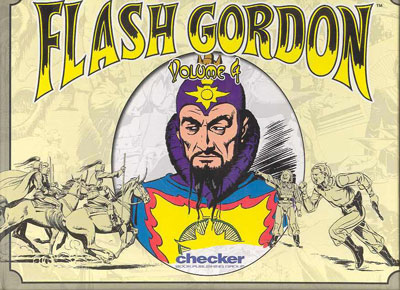
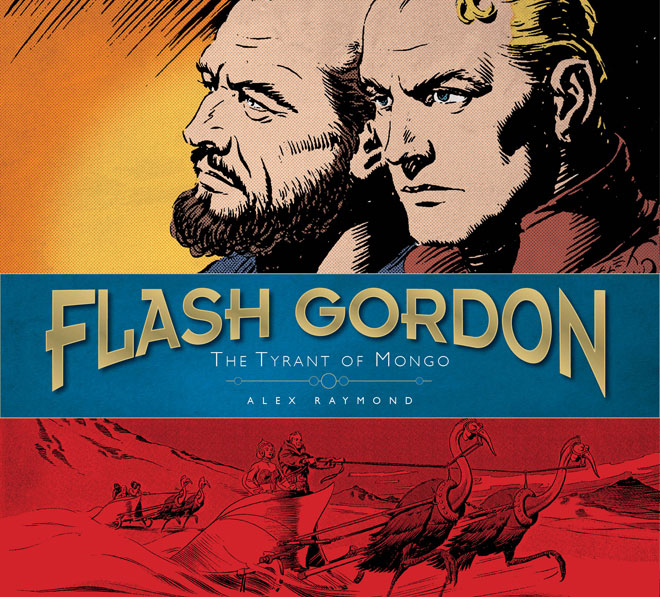 “The Tyrant of Mongo” was the twelfth installment of Alex Raymond’s Flash Gordon Sunday comic strip serial for King Features Syndicate. Originally printed between June 12, 1938 and March 5, 1939, the epic-length “Tyrant of Mongo” picks up the storyline where the eleventh installment, “Outlaws of Mongo” left off with Flash and the Freemen having sought refuge in the tombs of Ming’s ancestors. They befriend Chulan the caretaker who joins the Freemen. The flooding of Mingo City has thrown the kingdom into disarray. Flash and a group of Freemen storm the Navy’s flagship only to find its captain only too willing to join the fight against the Emperor.
“The Tyrant of Mongo” was the twelfth installment of Alex Raymond’s Flash Gordon Sunday comic strip serial for King Features Syndicate. Originally printed between June 12, 1938 and March 5, 1939, the epic-length “Tyrant of Mongo” picks up the storyline where the eleventh installment, “Outlaws of Mongo” left off with Flash and the Freemen having sought refuge in the tombs of Ming’s ancestors. They befriend Chulan the caretaker who joins the Freemen. The flooding of Mingo City has thrown the kingdom into disarray. Flash and a group of Freemen storm the Navy’s flagship only to find its captain only too willing to join the fight against the Emperor.
Emboldened by their success thus far, Flash and Captain Sudin lead the growing ranks of Freemen in a daring prison break to free Ming’s political prisoners. Naturally, they have walked into a trap. Scores of Freemen are decimated by Ming’s forces. Flash and an injured Sudin manage to escape with their lives. Unexpectedly, Flash and Sudin bombard the prison from their rocketship and rescuing those survivors they can reach attempt to make good their escape.
Crashing into the sea, Flash learns they are short one oxygen tank and heroically stays behind with the sinking ship while everyone else makes their way to freedom. Dale and Zarkov succeed in rescuing Flash, but Zarkov doesn’t believe his chances for survival are very strong. Of course, thanks to Zarkov’s surgical skill Flash does survive and recovers sufficiently to hastily design and oversee construction of a complex series of underground tunnels to house the Freemen. Naturally, their new-found tranquility is short-lived as Ming visits the island to bury his recently-deceased uncle (who Ming had killed when he learned he was plotting against him). A word should be said about Alex Raymond reaching new heights with his artwork in this installment. Raymond’s work was constantly evolving and it retains its power nearly 80 years later.
 Ever since interviewing Charlene Harris, I must admit to being a big fan of True Blood. But it’s important to note that the HBO series encompasses far more creatures than just vampires and the vampires that do reside in Bon Temps, LA where all the action takes place, at least adhere to the widely accepted folklore such as adversity to daylight, stakes through the heart, etc.
Ever since interviewing Charlene Harris, I must admit to being a big fan of True Blood. But it’s important to note that the HBO series encompasses far more creatures than just vampires and the vampires that do reside in Bon Temps, LA where all the action takes place, at least adhere to the widely accepted folklore such as adversity to daylight, stakes through the heart, etc.
No daytime sparkly angst here.
But let’s be honest. Between the TV shows and movies of the last five years, vampires are suffering from overexposure. And like any fad that has run its cultural course, nothing says “over” like being slapped on a lunch box come back-to-school time.
Goth Chick’s prediction for 2012 fashion? Vampires are out. Man-made monsters that defy all the laws of nature are way in.
To prove my point, there are already several early adopters in both the big and small screens.
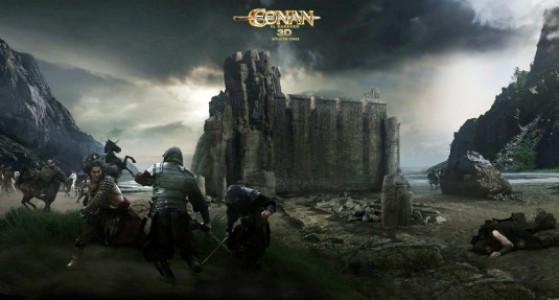
First off, no, this has nothing to do with Terry Brooks…
So I recently saw Conan 3D 2011… and yeah I know what you’re thinking, but I’m not going to go into that because it’s been beaten to death elsewhere, and certainly here on Black Gate. Still, I had to wonder after seeing it, what did the world of Hyboria get for its 2011 dollar?
Considering the movie reviews and box office receipts, whatever the cost for art direction it was far too much. As I watched, I contemplated the words of John Fultz and his thoughts concerning the imagery of the movie when he said… wait, I’m going to go look this up so John can’t complain I misquoted him… Ok, here we go…
The Hyborian Age has never looked so wondrous, splendid, and believable on screen. From the virgin wilderness and Cimmerian villages to the decadent, sprawling cities, the vast monasteries, and the ancient citadels with skull-shaped caves, the movie simply looks fantastic. The costuming too is spot-on and suitably grimy, evocative, and well-designed. Same goes for the props: swords, spears, armor, ships, etc.
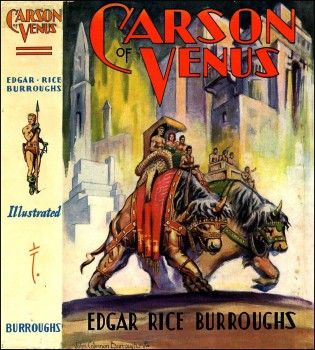 Five years have passed since Edgar Rice Burroughs wrote Lost on Venus, and the world has undergone a startling and disturbing metamorphosis. Something sinister and confusing is taking place in Europe, and across the Atlantic waters the people of the United States are growing concerned at the saber-rattling of Nazi Germany. The poverty-crippled period in which ERB wrote the previous Venus books has given way to a time of escalating fear of a second great war.
Five years have passed since Edgar Rice Burroughs wrote Lost on Venus, and the world has undergone a startling and disturbing metamorphosis. Something sinister and confusing is taking place in Europe, and across the Atlantic waters the people of the United States are growing concerned at the saber-rattling of Nazi Germany. The poverty-crippled period in which ERB wrote the previous Venus books has given way to a time of escalating fear of a second great war.
Does this have anything to do with the next novel of the Venus saga, 1938’s Carson of Venus? Of course not. That the villains of the book are called “the Zanis,” and that they rule through a tyrannical personality-cult dictatorship complete with ritualized salutes, concentration camps, and rampant murder of political undesirables is mere coincidence.
Our Saga: The adventures of one Mr. Carson Napier, former stuntman and amateur rocketeer, who tries to get to Mars and ends up on Venus, a.k.a. Amtor, instead. There he discovers a lush jungle planet of bizarre creatures and humanoids who have uncovered the secret of longevity. Carson finds time during his adventuring in the various warring countries of the planet to fall for Duare, forbidden daughter of a king. Carson’s story covers three novels, a volume of connected novellas, and a final orphaned novella.
Previous Installments: Pirates of Venus (1932), Lost on Venus (1933)
Today’s Installment: Carson of Venus (1938)
Edgar Rice Burroughs was in a creative slump at the close of the 1930s. The success of the Johnny Weissmuller Tarzan films at MGM and the creation of his own publishing company meant a steady flow of revenue, but the famous author found his new fiction getting rejected from the regular magazine markets that had featured him for more than twenty years. Even Tarzan was no longer dependable. Burroughs was not a young man anymore, and the magazine rejections seemed to hint that his best writing years were behind him. At least he could always publish the books through his own company, but the publicity from magazine serialization was an important way to boost sales.
It was during this turbulent time that ERB tried a few experiments. After leaving the Venus series alone for five years, he returned to it with a spy story reflecting the political tensions of the day.
 Dear Black Gate Readers,
Dear Black Gate Readers,
Something really cool just happened over on LiveJournal.
Since I’m sort of still grinning about it, I thought I’d take this opportunity to write about the importance of finding or creating a community of friends and artists who — even if they can’t do anything about your stack o’ rejections, those self-imposed deadlines you keep failing to make, or the number of times your head thumps a desk (in my case, the wall. I don’t know why, but I just find walls more… thumpable… somehow) — are there for you, in whatever way they can be. Even across the miles. Even across state lines! Or oceans!
This is a great age for long-distance friendships, isn’t it? I love it.
Writing is lonesome. And, you know what? THAT’S WHY IT’S APPEALING! You’re one on one with yourself, dueling with your demons, exploring your dreamscapes, loaded to the max with your Tools of Toil: laptop, fountain pen, coffee mug (in my case, tea cup, ’cause coffee? GROSS!), notebooks, dictionary (or dictionary.com), and nothing to disturb you except maybe the dishes, the laundry, the kids (well, NOT in my case, but I know plenty of writers who are parents), the bills, and everything else we have to deal with.
That great escape into lonesomeness is one of the best things about writing.
But sometimes you get discouraged, maybe. And maybe that’s when the lonesomeness is not so great anymore.
So you go to your community. Maybe you post about it on your blog. Anything to make the burden lighter.
And then, in the midst of your writer pals’ commiserations, something like this might happen…
 Further news on the plight of the physical bookstore front. Berkeley’s Serendipity Books is closing. Man, if a bookstore can’t survive in Berkeley, where can it? Well, one place is Charlottesville, VA, which I chose to move to in part because of the plethora of bookstores. But even here in this cultural mecca that shades blue in otherwise red territory, bookstores may not survive the retirement or demise of their owners.
Further news on the plight of the physical bookstore front. Berkeley’s Serendipity Books is closing. Man, if a bookstore can’t survive in Berkeley, where can it? Well, one place is Charlottesville, VA, which I chose to move to in part because of the plethora of bookstores. But even here in this cultural mecca that shades blue in otherwise red territory, bookstores may not survive the retirement or demise of their owners.
In related news, Criminal Records, one of Atlanta’s largest non-chain music retailers whose owner was involved in forming Record Store Day, a nationwide event to increase awareness of and traffic to independent record stores, is expected to close by November, barring some benefactor. Eric Levin blames the economy, not digital downloads or box stores, but it would also seem he missed the class about paying your taxes.
Speaking of the demise of physical presence, Michael Hart, who is credited with creating the first e-book forty years ago by typing the Declaration of Independence into a computer on, you guessed it, July 4, has died.
If you can, go out today to your local bookseller/record store and buy something. Do your bit to get the economy going. Exactly how someone is supposed to help you get your personal economy going, I’m not sure, but a good book or record can at least make you feel better about not being able to buy other stuff you can’t afford.
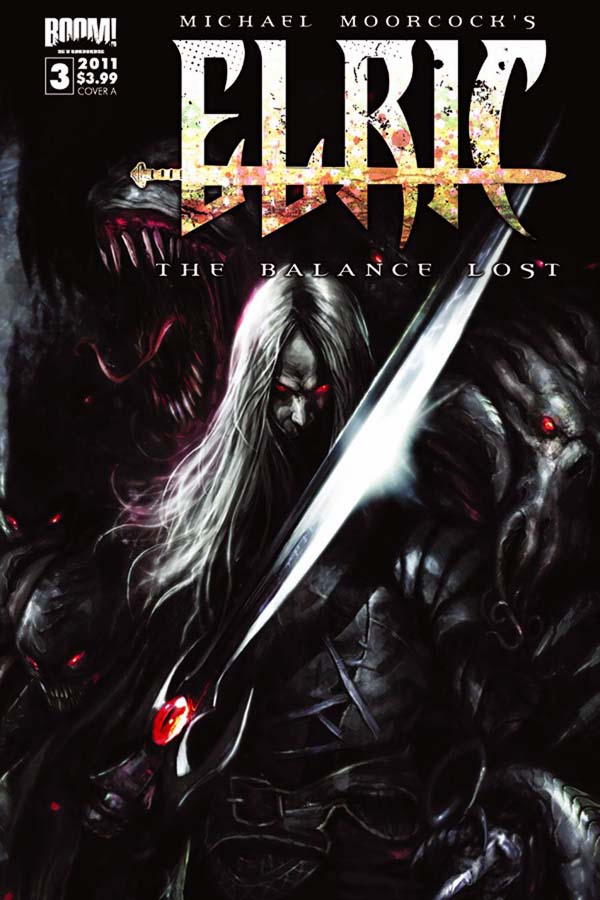
“Arioch! Blood and Souls!”
When I heard that Boom! Studios was putting together a new series starring Michael Moorcock’s most beloved and iconic character Elric of Melnibone, I was instantly on board. Especially when the Free Comic Book Day preview was released. Lo and behold! Great art by Francesco Biagini was just what the Prince of Ruins needed to bring him to life in a new comics venture!
So I jumped on board when the first issue of ELRIC: THE BALANCE LOST hit the comics stands, and I was pleasantly surprised that not only was the art fantastic, but the writing is good as well. Chris Roberson does a nice job filling Moorcock’s shoes, throwing multiversal concepts around with great abandon. Great art. Great writing. What’s not to like?
Here’s the problem: ELRIC isn’t really an ELRIC comic. We’re three -and-a-half issues in and we’ve gotten only about one issue’s worth of Elric story time (if that). The trouble with this new book is that it should be called Michael Moorcock’s ETERNAL CHAMPION because every issue is divided between the ongoing (and apparently unrelated!) stories of Elric and several other Moorcock creations: Dorian Hawkmoon, Corum Jhaelen, and Eric Beck (?). Only those who are familiar with Moorcock’s body of non-comics fiction will have any idea that each of these characters is a variation or facet of the Eternal Champion–the hero that exists in all realities at once.
Instead of featuring Elric of Melnibone as its main character, we get a melange of four different stories–a blend of science fiction, steampunk, alternate history, and a smidgen of sword-and-sorcery. “What’s wrong with that? Sounds like a nice blend!” I hear somebody asking in the back row. The problem isn’t in the concepts, it’s in the execution.
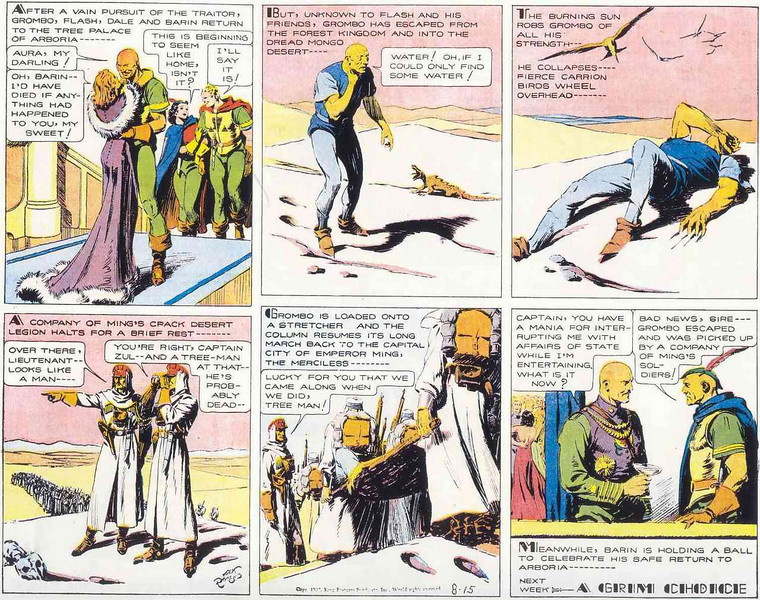
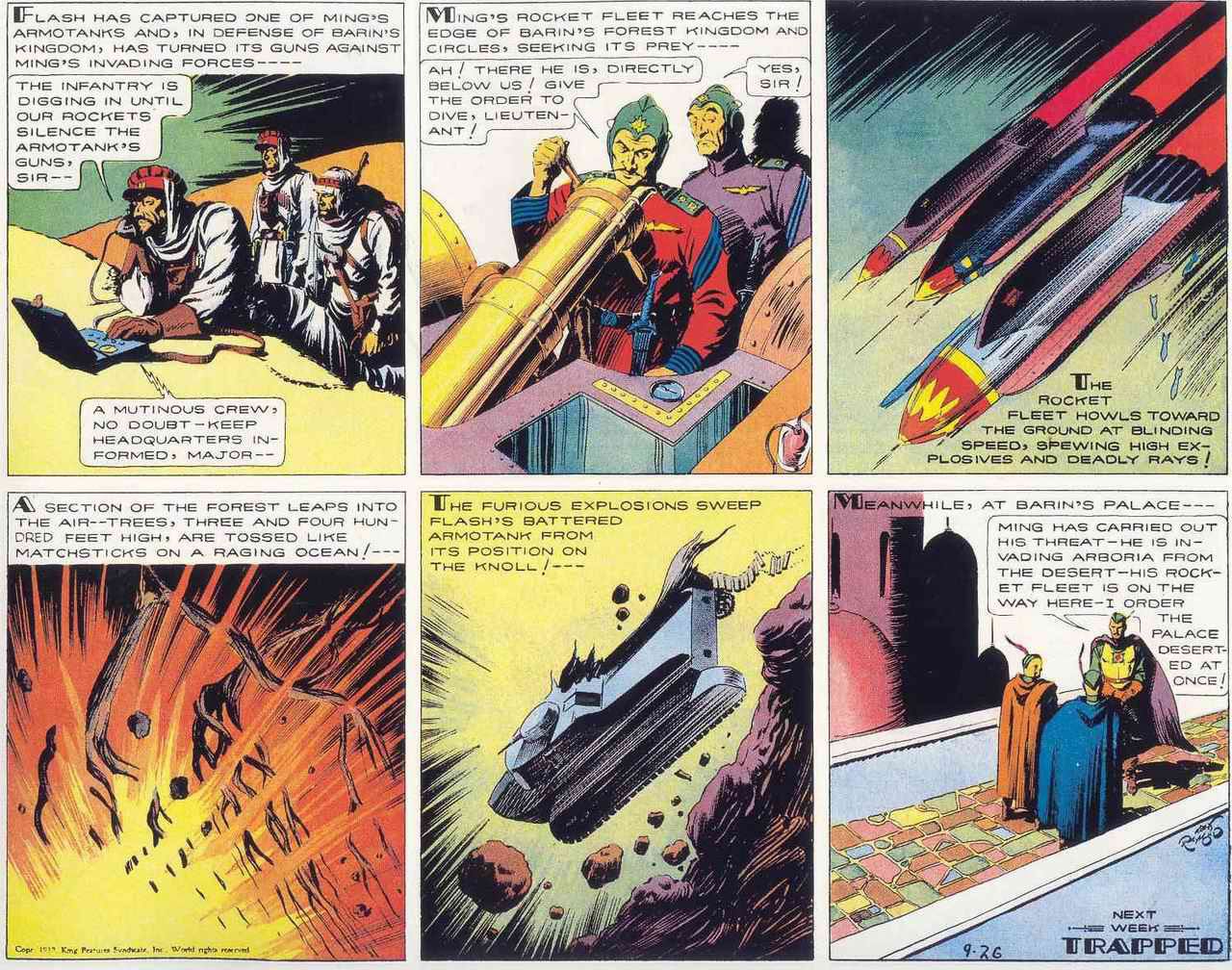 “Outlaws of Mongo” was the eleventh installment of Alex Raymond’s Flash Gordon Sunday comic strip serial for King Features Syndicate. Originally printed between August 15, 1937 and June 5, 1938, the epic-length “Outlaws of Mongo” picks up the storyline where the tenth installment, “The Beast Men of Mongo” left off with Barin, Flash and Dale returning to Arboria. The traitor, Grombo collapses while crossing the desert, but is saved from carrion birds by Ming’s Desert Legion. Ming rewards Grombo by appointing him a Captain. Ming confronts Barin and demands that he hand Flash and Dale over, Barin refuses. Fearing the situation will quickly escalate to a war that would devastate Arboria, Flash decides to flee to the jungles of Arboria so that Barin can report his escape to Ming. The Emperor, of course, demands Barin hand Dale over and when he refuses, Ming orders Arboria destroyed by his air fleet.
“Outlaws of Mongo” was the eleventh installment of Alex Raymond’s Flash Gordon Sunday comic strip serial for King Features Syndicate. Originally printed between August 15, 1937 and June 5, 1938, the epic-length “Outlaws of Mongo” picks up the storyline where the tenth installment, “The Beast Men of Mongo” left off with Barin, Flash and Dale returning to Arboria. The traitor, Grombo collapses while crossing the desert, but is saved from carrion birds by Ming’s Desert Legion. Ming rewards Grombo by appointing him a Captain. Ming confronts Barin and demands that he hand Flash and Dale over, Barin refuses. Fearing the situation will quickly escalate to a war that would devastate Arboria, Flash decides to flee to the jungles of Arboria so that Barin can report his escape to Ming. The Emperor, of course, demands Barin hand Dale over and when he refuses, Ming orders Arboria destroyed by his air fleet.
Don Moore and Alex Raymond’s stories were growing more complex and as a consequence, Mongo and its lands and peoples were becoming more detailed. The two also clarify the point that the kingdoms of Mongo are denied the technology that Ming’s forces command to ensure they cannot successfully revolt. Moore’s script also specifies that Barin views Flash as a savior who has come to Mongo to liberate its kingdoms from Barin’s tyrannical father-in-law. Flash stumbles out of the jungles of Arboria into the desert and discovers Ming’s tanks are rolling in. Flash singlehandedly commandeers a tank, overpowering the crew and turns its gun on the rest of the fleet as well as the infantry. Meantime, the air fleet has launched and is en route to bomb Arboria.
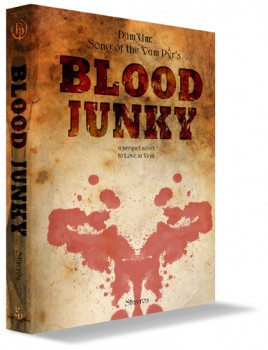 If you happen to be familiar with the Black Gate submission guidelines, then you’ve read the following on our feelings about vampires around the office:
If you happen to be familiar with the Black Gate submission guidelines, then you’ve read the following on our feelings about vampires around the office:
We see far too much bad vampire fiction, and if you think you’re going to surprise readers by revealing your hero is a vampire on the last page, you’re dead wrong.
As a hard-core vampire fan you might think this would be just another chafing point for me, along with the toilet seat being left up in the unisex bathrooms and Scott Taylor coming in shirtless and pretending to be an Ork every Halloween.
But no.
I wholeheartedly support this anti-vampire stance but not just because most vampire fiction is bad. It’s because it is a rare thing indeed, to find a truly unique take on the concept. Bram Stoker created an epic character and ever since, it’s pretty much been the same thing only different; slight variations on all the major themes of immortality, blood consumption, aversion to daylight, etc, etc, etc.
Yawn.
Imaginative vampires in literature are as difficult to find as the real thing, but thankfully, not impossible.
Enter Stavros — an artist and author who, like Dracula, goes by one name — and his first novel Blood Junky. I devoured the book in one sitting which is not what I expected to do when I first talked to Stavros about it at this year’s Comic-Con. This story was really, truly different; it was cool and kind of gross. I couldn’t put it down.
I had to know more about this guy and this book.